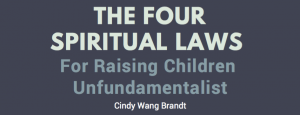
The Danger of Certainty in Adolescence
February 5, 2018

Photo by Matthew Gerrard on Unsplash
“I don’t think any of us, at seventeen, felt like we were exactly on the right path,” says Cheryl Strayed on the Dear Sugars podcast, responding to advice from a struggling seventeen year old.
“I did,” I thought to myself, I was very sure of who I was (a Christian), who I belonged to (Jesus), and what my right path was in life (tell the world about Jesus.) I was an evangelical teen.
“I think, actually, at seventeen, if you feel you’re on the right path, it’s a trap.” Steve Almond, the co-host of the Sugars podcast follows up, and ouch! says seventeen-old-me.
At the time, I was admired, respected, given awards for my godly aspirations, so that my certainty was reinforced and not questioned. How was it that I had the audacity to claim such certainty at such a young age? It was because I held the God card. From early on, we were encouraged to seek God’s will for our lives, to listen deeply to God’s voice, and to obey when we received a call. I thought I heard a call (to tell the world about Jesus) and I responded to it, I was trained in my discipleship to be obedient with gladness. If God had said yes, I was sure, no questions asked. Nobody told me what an arrogant ass I was, but that’s understandable because I was also really, really nice and I didn’t use potty words like “ass.”
I mean, idealism and over-confidence may be a general trait for teens who weren’t evangelical, but evangelical culture encouraged it with the God-card (see above). The problem with arrogance in adolescence is not just that it’s not a pretty trait—nobody likes a know-it-all—it leaves one in a vacuum void of curiosity. An arrogant teen who believes she knows exactly what God wants lacks humility to learn, for who has the authority argue with God’s voice? The God card trumps all cards, and the adolescent becomes unteachable, missing opportunities to learn from sensibly people who are too exasperated to speak into her life.
If God can do no wrong then the teen can do no wrong. There isn’t room for mistakes and learning from them when you’re sure God is always right. When things in life didn’t work out for me, I spent all my energies trying to reconcile the events to what I felt God wanted, constantly playing defense instead of reevaluating my decisions and priorities. And all that time holding onto the tensions of cognitive dissonance could have been spent learning valuable life skills.
But the most damaging thing about being a certain teen is that it held me back from taking risks. It’s ironic, really, because you would think being sure of God’s will in our lives would enable one to dive into adventures without reservations. But the reality is that God’s will, if it exists, is elusive and fluid and open to mistaken interpretations. And because a belief in certitude doesn’t match up to the experience of uncertainty, the teen moves through life reserved—anxious about whether they are walking in the right path according to the will of God, fearful of veering astray. They are reticent to correct course because so much is at stake.
It doesn’t have to be this way. We can give adolescents the permission to be exactly who they are: young, unsure, inexperienced, but full of energy, idealism, and hope. Let them explore the world uninhibited from needing to be right all the time. Help them express their lives authentically as it is: fragile, unpredictable, filled with mishaps and regrets, but also with all that the potential for surprising plot twists and moments of great joy.
There is just one path. On that road there are trials and errors, twists and turns. The path leads to adventures that are terrifying, and others that are exciting, and sometimes it’s just a boring old road and nothing much happens for a long stretch. There’s not a right or wrong path, it’s just their unique journey to travel.
“If, at seventeen, you feel you’re on the right path, it’s a trap,” Steve Almond said. In hindsight, I agree. I was trapped at seventeen, but now I’m breaking free. And I want seventeen year olds today to be free to be unsure, open to mistakes and successes, and unafraid to try. Be wild and weird and wonder if you know what the heck you’re doing, because it’s okay if you don’t.
Psssst…most of us still don’t.
Sign up for my parenting newsletter and get the four alternative spiritual laws:
http://eepurl.com/cMmHmD
